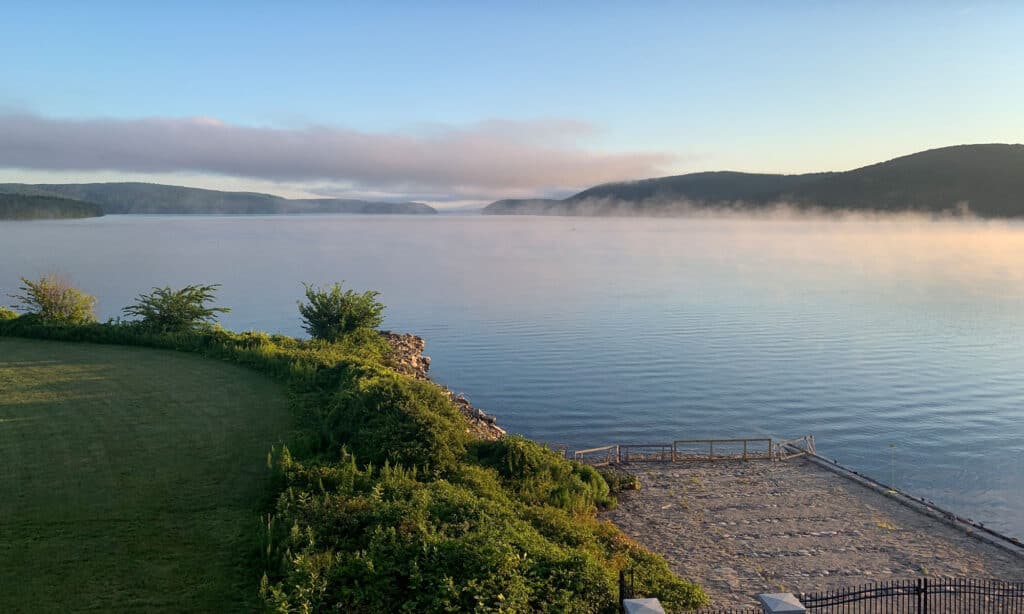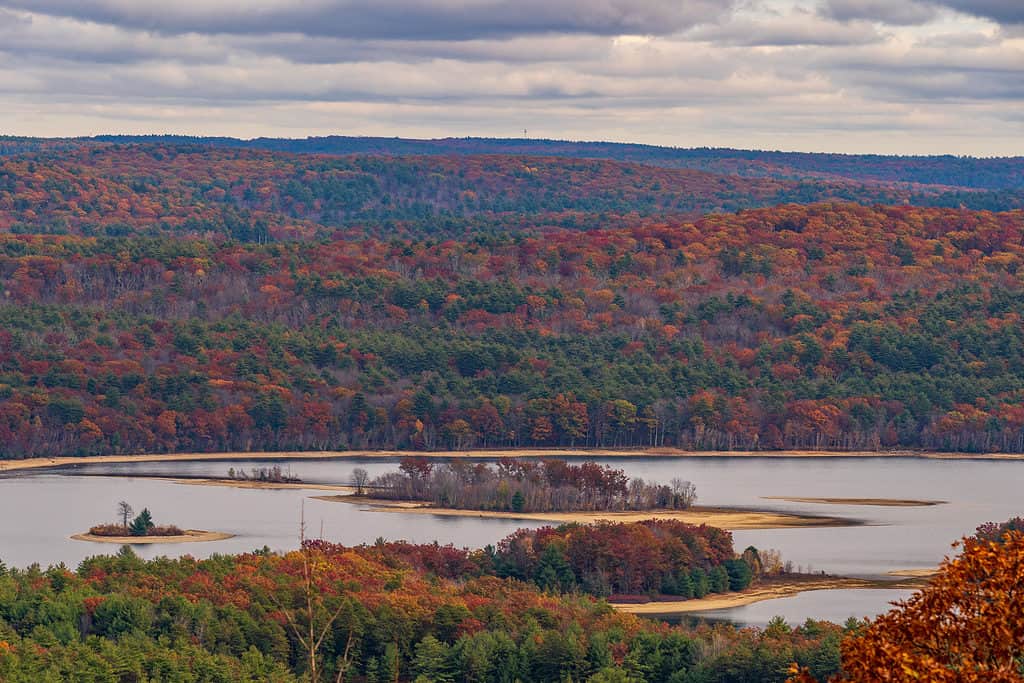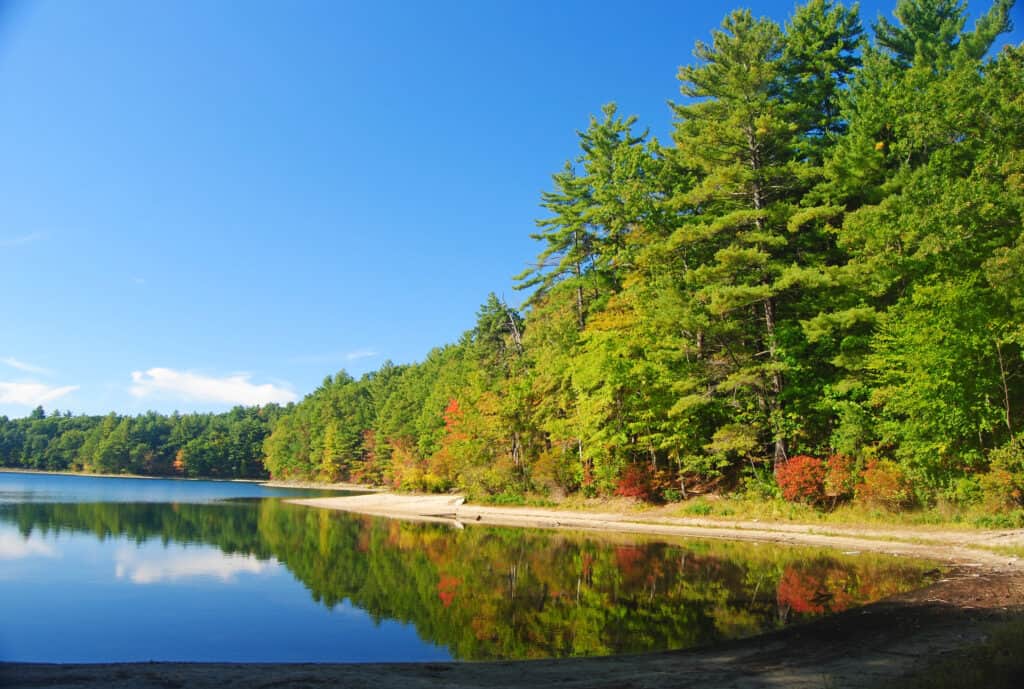Massachusetts is a northeastern state known as the “Bay State” due to the popular bays located along the Atlantic Coast. You may be familiar with the bays, capes and beaches along the coast like the Massachusetts Bay, Cape Cod and Ipswich Bays. But besides the stunning bays the state also has amazing lakes, both natural and man-made that are some of the cleanest lakes in the country. Often the biggest lakes are also the deepest lakes but that is not always the case. Cool deep lakes in Massachusetts offer excellent fishing opportunities and are a major source of drinking water. Let’s take a look at the deepest lake in Massachusetts!
What is the Deepest Lake in Massachusetts?
The deepest lake in Massachusetts is the Quabbin Reservoir. The Quabbin Reservoir is the deepest man-made lake in the state, and it is also the biggest lake in the state. According to the Commonwealth of Massachusetts the lake is “one of the largest unfiltered water supplies in the United States”. It provides drinking water to more than 3 million people in the area. Keeping the lake clean and pristine is a priority so there are many regulations to ensure the waters and the surrounding area remains protected. The Quabbin Reservoir covers 39 square miles and can hold 412 billion gallons of water. For comparison, can you picture 412 billion jugs of water all in one spot? Hard to wrap your brain around.

©iStock.com/jon pursell
How Deep is the Deepest Lake in Massachusetts?
The deepest lake in Massachusetts is 151 feet deep. The Quabbin Reservoir is located right in the middle of the state and is a long vertical lake that is 18 miles long with 118 miles of shoreline. Clearing the valley to make room for the reservoir began back in 1927 with the impoundment of the Swift River. The strict regulations around the Quabbin Reservoir have created a unique habitat where wildlife thrives. You can find wild turkeys, white-tail deer, bobcats, coyotes and bald eagles enjoying the relatively undisturbed surroundings of the lake.
What Rules Help Protect the Quabbin Reservoir?
To protect the water supply there are several rules about the lake that you should be aware of. There are no dogs allowed at Quabbin Park or around the lake. Swimming is not allowed in the lake. Camping is not allowed at the lake nor is building a fire or firing up the grill. Even though the Quabbin Reservoir may not allow some of your typical recreational lake activities it does allow for amazing wildlife watching, hiking and fishing.

©Belia Koziak/Shutterstock.com
Can You Fish in the Quabbin Reservoir?
Yes! Fishing is one of the recreational activities allowed at the Quabbin Reservoir but there are some rules. You can only fish in designated areas. Fishing from shore or by boat in these areas does offer some excellent fishing opportunities. Think about bringing home a string of lake trout caught from some of the cleanest water on the planet! Anglers target lake trout, rainbow trout, brown trout, salmon, smallmouth bass, largemouth bass, perch and pickerel. Fishing tip: the fish that prefer the deepest, coolest water (trout and salmon) are typically found in the west arm of the Reservoir accessible from Gate #8 (Boat Launch Area #1).
Are there any State Fishing Records from the Quabbin Reservoir?
Yes! Two of the biggest “catch and keep” records were pulled from the Quabbin Reservoir. It is not surprising that a deep cool lake like Quabbin would produce the biggest lake trout. William Roy caught a 25 pound 7 ounce lake trout back in 2016. The trout measured 33 inches long, that is nearly 3 feet! The biggest walleye ever caught in Mass. was also caught on the Quabbin Reservoir. An 11 pound walleye was caught by Robert Methot back in 1973 and the record has held for nearly 50 years!
A “catch and release” record was also set on the Quabbin when Gary Morin reeled in a landlock salmon that measured 27.25 inches in length. Clearly the fresh waters of the Quabbin Reservoir are producing healthy sized fish of many species.
Were Four Towns Destroyed to Make Room for the Quabbin Reservoir?
Yes. The Swift River Valley was occupied by the four towns of Dana, Enfield, Prescott and Greenwich. In 1927 the legislature of Massachusetts decided the Swift River Valley was the best place to put the new reservoir to provide drinking water for the growing Boston area. The decision affected 2,500 residents that were forced to move. While some man-made reservoirs cover up old ghost towns, everything in the valley was clearcut or bunrned to be ready for the flooding. So if you could scuba dived to the bottom of the Quabbin Reservoir there would not be much to explore.
What is the Deepest Natural Lake in Massachusetts?
The deepest natural lake in Massachusetts is Walden Pond. Yes, the infamous Walden Pond in Concord, Massachusetts where author Henry David Thoreau lived in his simple cabin. A replica of the cabin is at the Walden Pond State Reservation and open to visitors. The pond itself is only 62 acres but the deepest spot on the lake in the west central area of the lake is around 100 feet deep.

©iStock.com/AlizadaStudios
Can you Fish on Walden Pond?
Yes. You can fish on Walden Pond but no gas-powered boats are allowed. The lake is stocked with trout in the spring and fall. Fish that have been documented on the lake include trout, largemouth bass, smallmouth bass, brown bullhead, rainbow smelt, bluegill, pumpkinseed, and chain pickerel.
Are there any Fishing Records from Walden Pond?
There are no state fishing records from Walden Pond but there are a number of catches that have qualified for the Freshwater Sportfishing Awards Program in Massachusetts. Anglers that are fishing on Walden Pond may be more about the experience of spending a cool morning on a peaceful pond connecting with nature vs. reeling in the big one, but that is just speculation!
How Does the Deepest Lake in Massachusetts Compare to the Deepest Lake in the US?
When you compare the deepest lake in Massachusetts at 151 feet deep to deepest lake in the US is it really that deep? No, not really. The deepest lake in the US is 1,949 feet deep! We know that the Quabbin Reservoir is a man-made lake, and Walden Pond is a natural lake, but what about Crater Lake? Did we dig a nearly 2,000 foot deep hole for a lake? No. Crater Lake is not man-made, it is a natural lake that formed in the top of a collapsed volcano. The beautiful crystal blue waters are only from rain and snow melt, making it another incredibly clear lake in the US. Had Henry David Thoreau grown up in Oregon and not Massachusetts I imagine he would have settled in nicely on the shores of Crater Lake.
Is Crater Lake a Recreational Lake?
The land around Crater Lake is not developed and is part of the Crater Lake National Park. To protect the water clarity of Crater Lake there are also many restrictions to keep invasive species out. While you can hike to the water’s edge and go for a swim (or a dip due to the chilly water), you are not allowed to snorkel, bring inner tubes or any other floating devices. Fishing is allowed but only with artificial lures. The two fish species that have been introduced into the lake that are still thriving are rainbow trout and kokanee salmon. Similar to fishing on Walden Pond, I imagine a day fishing from the shores of Crater Lake would be peaceful and serene.
Up Next
- The 5 Best Fish to Catch in Massachusetts this Summer
- The 12 Biggest Lakes in Massachusetts
- The 15 Deepest Lakes in the United States
The post Discover the Deepest Lake in Massachusetts appeared first on AZ Animals.
from Animal News, Facts, Rankings, and More! - AZ Animals https://ift.tt/LBRf7XJ